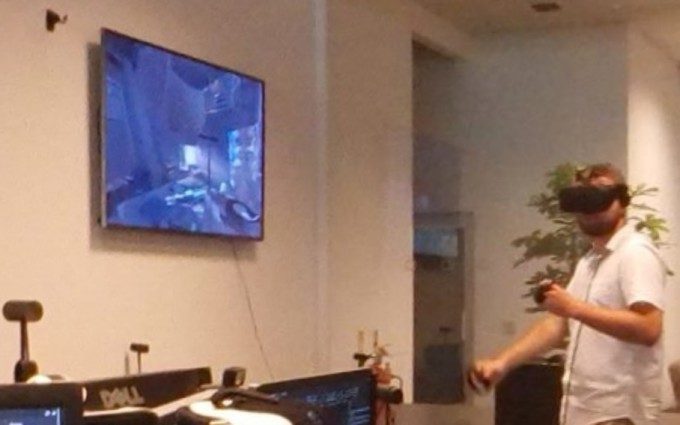4A Games, the developers behind the popular sci-fi shooter franchise ‘Metro’, are not only allegedly working on an Oculus Rift title with Touch support, there’s a chance we’ll get to see it soon. In the mean time, this is what we know.
Oculus’ reasoning for the protracted delay in the launch of their VR motion controllers ‘Touch’ is that they need to ensure the consumer has enough compelling content to make it an essential purchase. Head of Oculus Studios Jason Rubin spoke to Road to VR at a special pre-GDC event this year on just that topic (see interview below), and more recently at Gamescom. Holding the launch of Touch, pending the arrival of more substantial, quality titles from established developers has predictably taken some time, but we may start to see Oculus’ patience (and ours) and pay off soon.
 One of the content partners teased by Oculus at its Oculus Touch unveiling at a pre-E3 event last year, was 4A Games, a development team which made a name for itself building the excellent Metro series, may be about ready to show what it’s been working on.
One of the content partners teased by Oculus at its Oculus Touch unveiling at a pre-E3 event last year, was 4A Games, a development team which made a name for itself building the excellent Metro series, may be about ready to show what it’s been working on.
The company initially published a 360 screenshot via their facebook page at the beginning of this month which not only showed 4A’s development offices in Malta strewn with Oculus Rift headsets, but also several pairs of Oculus Touch controllers can be seen on desks and in hand too. In fact, one angle shows a developer in the middle of play testing a Touch title, which can be seen displayed on the wall-hung TV in front of him.
This may or may not be an early glimpse at the soon-to-be-revealed title, but other shots of developer monitors pulled from the panoramic shot almost certainly are.
When might we see this new title? Well, sharp-eyed Redditer /u/bekris over at /r/oculus noted that yet another angle from the 360 photo revealed a TV hung in the office with a large countdown clock reading just under 34 days at the time the photo was taken (around September 1st judging purely by its posted time on Facebook) – that would indicate a target date which coincides nicely with Oculus’ forthcoming third developer conference Connect, which starts on October 5th.
And whilst this assumption is not confirmed officially by 4A Games, Oculus’ Jason Rubin later tweeted out the Facebook post saying “Remember when I teased 4A games as an Oculus Partner looong ago? Well they’ve been working hard and it’s coming.”
Remember when I teased 4A games as an Oculus Partner looong ago? Well they've been working hard and it's coming: https://t.co/IHQ3GdpGfi
— Jason Rubin (@Jason_Rubin) September 17, 2016
As I write this, we currently only have one official shot of this mysterious title and it was posted a few days ago, again on 4A Games’ Facebook page. The screenshot is obscure at best, but does seem to show some kind of futuristic suit, specifically what looks to be a glove grasping a weapon – the grip for which can be seen on the edge of the frame.
Minor Update: Our community has been chiming in with their thoughts on what the images tell us. The image below is more likely of a hand gripping a joystick, the kind you’d find in a futuristic mech. This also ties in the with the images below. Thanks Bas van Elst for the thoughts.
 This could indicate the title is the first person shooter title that Jason Rubin hinted at in a recent interview with PCGamesN here in which he highlighted the challenges inherent in bringing the genre to VR.
This could indicate the title is the first person shooter title that Jason Rubin hinted at in a recent interview with PCGamesN here in which he highlighted the challenges inherent in bringing the genre to VR.
As fun as all this speculation is, we’re now forced to wait for further information from both Oculus and 4A games to know what the game actually is. But with the Oculus Touch launch window of Q4 this year edging closer, a new triple-A first person shooter exclusive from a respected triple-A developer would be exactly what Oculus needs to begin putting a troubled 2016 behind them and follow through on that content promise for their new motion controllers.











